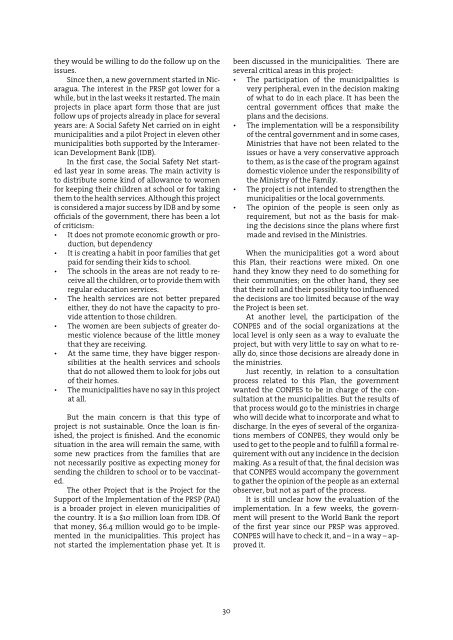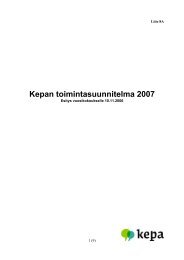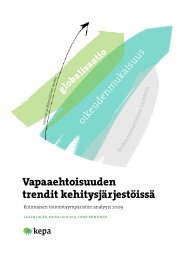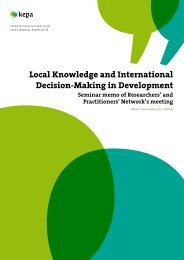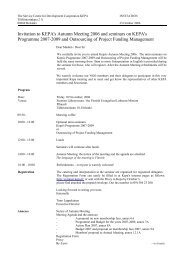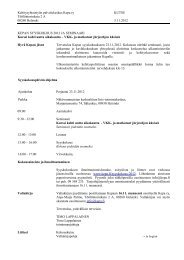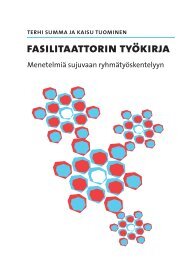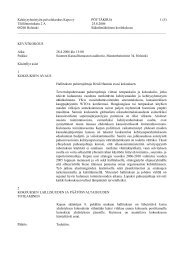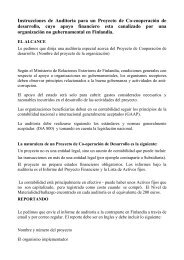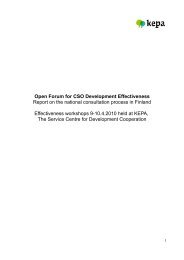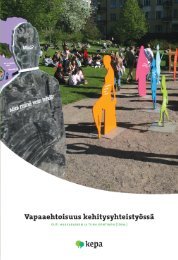La sociedad civil organizada en Nicaragua, composición y ... - Kepa.fi
La sociedad civil organizada en Nicaragua, composición y ... - Kepa.fi
La sociedad civil organizada en Nicaragua, composición y ... - Kepa.fi
Create successful ePaper yourself
Turn your PDF publications into a flip-book with our unique Google optimized e-Paper software.
they would be willing to do the follow up on the<br />
issues.<br />
Since th<strong>en</strong>, a new governm<strong>en</strong>t started in <strong>Nicaragua</strong>.<br />
The interest in the PRSP got lower for a<br />
while, but in the last weeks it restarted. The main<br />
projects in place apart form those that are just<br />
follow ups of projects already in place for several<br />
years are: A Social Safety Net carried on in eight<br />
municipalities and a pilot Project in elev<strong>en</strong> other<br />
municipalities both supported by the Interamerican<br />
Developm<strong>en</strong>t Bank (IDB).<br />
In the <strong>fi</strong>rst case, the Social Safety Net started<br />
last year in some areas. The main activity is<br />
to distribute some kind of allowance to wom<strong>en</strong><br />
for keeping their childr<strong>en</strong> at school or for taking<br />
them to the health services. Although this project<br />
is considered a major success by IDB and by some<br />
of<strong>fi</strong>cials of the governm<strong>en</strong>t, there has be<strong>en</strong> a lot<br />
of criticism:<br />
• It does not promote economic growth or production,<br />
but dep<strong>en</strong>d<strong>en</strong>cy<br />
• It is creating a habit in poor families that get<br />
paid for s<strong>en</strong>ding their kids to school.<br />
• The schools in the areas are not ready to receive<br />
all the childr<strong>en</strong>, or to provide them with<br />
regular education services.<br />
• The health services are not better prepared<br />
either, they do not have the capacity to provide<br />
att<strong>en</strong>tion to those childr<strong>en</strong>.<br />
• The wom<strong>en</strong> are be<strong>en</strong> subjects of greater domestic<br />
viol<strong>en</strong>ce because of the little money<br />
that they are receiving.<br />
• At the same time, they have bigger responsibilities<br />
at the health services and schools<br />
that do not allowed them to look for jobs out<br />
of their homes.<br />
• The municipalities have no say in this project<br />
at all.<br />
But the main concern is that this type of<br />
project is not sustainable. Once the loan is <strong>fi</strong>nished,<br />
the project is <strong>fi</strong>nished. And the economic<br />
situation in the area will remain the same, with<br />
some new practices from the families that are<br />
not necessarily positive as expecting money for<br />
s<strong>en</strong>ding the childr<strong>en</strong> to school or to be vaccinated.<br />
The other Project that is the Project for the<br />
Support of the Implem<strong>en</strong>tation of the PRSP (PAI)<br />
is a broader project in elev<strong>en</strong> municipalities of<br />
the country. It is a $10 million loan from IDB. Of<br />
that money, $6.4 million would go to be implem<strong>en</strong>ted<br />
in the municipalities. This project has<br />
not started the implem<strong>en</strong>tation phase yet. It is<br />
be<strong>en</strong> discussed in the municipalities. There are<br />
several critical areas in this project:<br />
• The participation of the municipalities is<br />
very peripheral, ev<strong>en</strong> in the decision making<br />
of what to do in each place. It has be<strong>en</strong> the<br />
c<strong>en</strong>tral governm<strong>en</strong>t of<strong>fi</strong>ces that make the<br />
plans and the decisions.<br />
• The implem<strong>en</strong>tation will be a responsibility<br />
of the c<strong>en</strong>tral governm<strong>en</strong>t and in some cases,<br />
Ministries that have not be<strong>en</strong> related to the<br />
issues or have a very conservative approach<br />
to them, as is the case of the program against<br />
domestic viol<strong>en</strong>ce under the responsibility of<br />
the Ministry of the Family.<br />
• The project is not int<strong>en</strong>ded to str<strong>en</strong>gth<strong>en</strong> the<br />
municipalities or the local governm<strong>en</strong>ts.<br />
• The opinion of the people is se<strong>en</strong> only as<br />
requirem<strong>en</strong>t, but not as the basis for making<br />
the decisions since the plans where <strong>fi</strong>rst<br />
made and revised in the Ministries.<br />
Wh<strong>en</strong> the municipalities got a word about<br />
this Plan, their reactions were mixed. On one<br />
hand they know they need to do something for<br />
their communities; on the other hand, they see<br />
that their roll and their possibility too influ<strong>en</strong>ced<br />
the decisions are too limited because of the way<br />
the Project is be<strong>en</strong> set.<br />
At another level, the participation of the<br />
CONPES and of the social organizations at the<br />
local level is only se<strong>en</strong> as a way to evaluate the<br />
project, but with very little to say on what to really<br />
do, since those decisions are already done in<br />
the ministries.<br />
Just rec<strong>en</strong>tly, in relation to a consultation<br />
process related to this Plan, the governm<strong>en</strong>t<br />
wanted the CONPES to be in charge of the consultation<br />
at the municipalities. But the results of<br />
that process would go to the ministries in charge<br />
who will decide what to incorporate and what to<br />
discharge. In the eyes of several of the organizations<br />
members of CONPES, they would only be<br />
used to get to the people and to ful<strong>fi</strong>ll a formal requirem<strong>en</strong>t<br />
with out any incid<strong>en</strong>ce in the decision<br />
making. As a result of that, the <strong>fi</strong>nal decision was<br />
that CONPES would accompany the governm<strong>en</strong>t<br />
to gather the opinion of the people as an external<br />
observer, but not as part of the process.<br />
It is still unclear how the evaluation of the<br />
implem<strong>en</strong>tation. In a few weeks, the governm<strong>en</strong>t<br />
will pres<strong>en</strong>t to the World Bank the report<br />
of the <strong>fi</strong>rst year since our PRSP was approved.<br />
CONPES will have to check it, and – in a way – approved<br />
it.<br />
30


